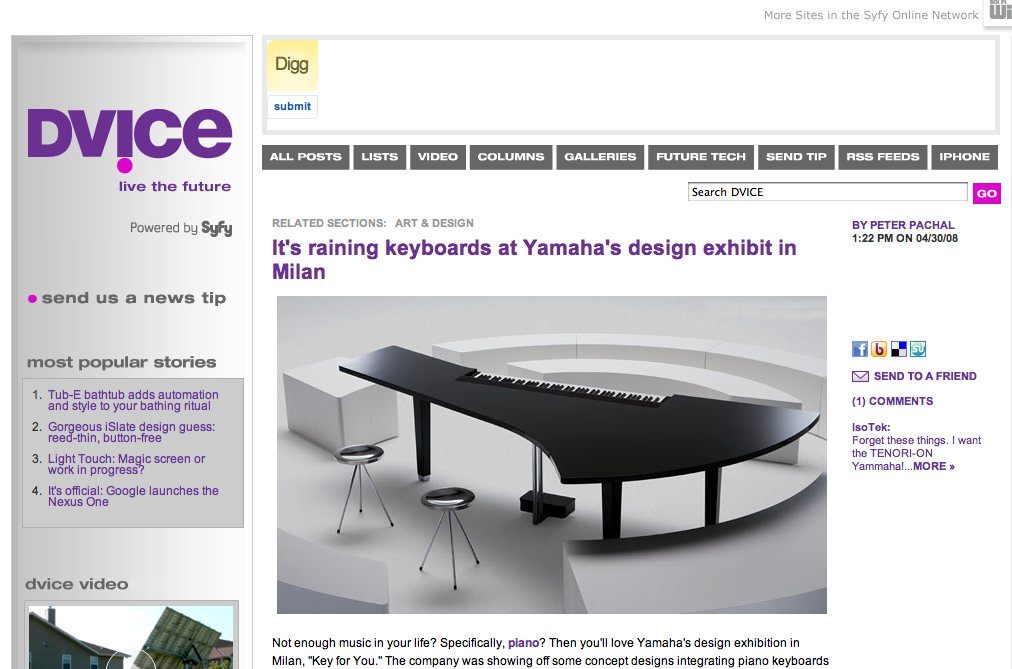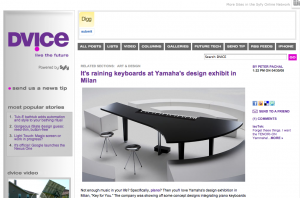Check out these pictures at dvice.com, featuring modern keyboard designs by Yamaha! I particularly like the one shown in the screenshot at right.
Would I ever buy a keyboard such as this? No, probably not. If I had the money to spend, I’d buy an acoustic piano, not a keyboard. Acoustic pianos are still far superior to keyboards, even considering the great improvements that have been made to keyboards over the years. They just don’t compare, in my book.
However, the popularity of keyboards seems to be increasing. I’ve experienced an increasing number of experiences with parents who wish to buy keyboards for their beginner students instead of pianos. And I can understand why: they are often cheaper than buying both new and used pianos, are far easier to move, and do not have it tuned every six months. The advantages of buying a keyboard are obvious, but there are some major not-so-obvious disadvantages.
Just last week, I had an experience with a recently-acquired beginner student, at the college-age. At our first lesson together, we spent quite a bit of time working on hand shape, wrist alignment/position, fingers, etc. She had been doing very well with all of these items, for it seemed quite natural for her. She did mention that she played quite a bit with digital pianos with weighted keys. At our second lesson together, I noticed some serious problems with the way she was playing. She was pressing down into the keys instead of pulling them down using arm weight, her wrists were far too high, and her finger joints were caving in all over the place. She had been doing these things correctly as instructed at the first lesson. I couldn’t believe my eyes. What had happened?
She had been practicing on a cheap keyboard, that’s what. When I had originally inquired about her instrument, she stated that she owned a very good keyboard, but it was at her parents’ home and she would be bringing it to campus to practice on the next time she goes home for the weekend. I assured her this was no problem, since she could practice in the practice rooms provided in the music building on campus (where we have lessons). However, after our first lesson, she was so excited to practice that she decided to go out and buy a cheap keyboard to use for now. After just one week of practice on a cheap keyboard, her hand position, arm alignment, and finger shape had all gone kaput.
Perhaps some of you had similar experiences with students. Some teachers avoid this problem by requiring that their students own an acoustic piano. While I have not instituted such in a rule in my own studio, I do try to make sure parents are well-informed when shopping for pianos/keyboards. What parents do not always realize is that buying a cheap keyboard is usually not a good investment because of the problems that are bound to ensue.
However, there are higher-quality keyboards (often called digital pianos) that do not cause so many problems as the cheap ones do. They usually run in the $700-2000 range. I always encourage parents to buy acoustic pianos, but if they are set on buying a keyboard, I tell them what to look for:
- full 88-key keyboard — absolutely essential, even for beginner students.
- weighted keys — absolutely essential for developing good technique (although still not as good as an acoustic piano’s action).
- a good brand — Yamaha, Casio and Korg are some well-known brands for keyboards.
- pedal — even beginner students will need pedal for their pieces. If there isn’t one included on the keyboard, students can purchase one separately.
Here is a great article to have parents read when they are contemplating what to buy.
What experiences have you had with pianos versus keyboards?
(dvice.com link via keyboardpedagogy.blogspot.com)




Check out this link as well — it contains great advice for piano/keyboard shoppings.
I would love to hear from piano teachers who have used digital pianos in their studios and which one they recommend. I know digital pianos have really improved since this post was made. I am looking for a digital piano in the $1,000-$2,000 range. I have been looking at quite a few pianos and I am having a hard time choosing. Thinking of the Roland F130R, Casio Privia PX 350, or Kawai ES100. Any advice would be appreciated!
Hi Tami! I think you are right: digital pianos are definitely improving! I would suggest posting your question in one of the many facebook groups for piano teachers. I’m sure you will receive a lot of suggestions that way. I don’t have a lot of experience with different brands/models of keyboards. Good luck!